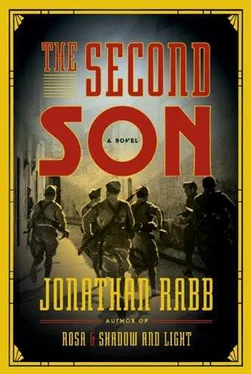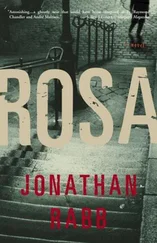Jonathan Rabb - The Second Son
Здесь есть возможность читать онлайн «Jonathan Rabb - The Second Son» весь текст электронной книги совершенно бесплатно (целиком полную версию без сокращений). В некоторых случаях можно слушать аудио, скачать через торрент в формате fb2 и присутствует краткое содержание. Жанр: Политический детектив, на английском языке. Описание произведения, (предисловие) а так же отзывы посетителей доступны на портале библиотеки ЛибКат.
- Название:The Second Son
- Автор:
- Жанр:
- Год:неизвестен
- ISBN:нет данных
- Рейтинг книги:4 / 5. Голосов: 1
-
Избранное:Добавить в избранное
- Отзывы:
-
Ваша оценка:
- 80
- 1
- 2
- 3
- 4
- 5
The Second Son: краткое содержание, описание и аннотация
Предлагаем к чтению аннотацию, описание, краткое содержание или предисловие (зависит от того, что написал сам автор книги «The Second Son»). Если вы не нашли необходимую информацию о книге — напишите в комментариях, мы постараемся отыскать её.
The Second Son — читать онлайн бесплатно полную книгу (весь текст) целиком
Ниже представлен текст книги, разбитый по страницам. Система сохранения места последней прочитанной страницы, позволяет с удобством читать онлайн бесплатно книгу «The Second Son», без необходимости каждый раз заново искать на чём Вы остановились. Поставьте закладку, и сможете в любой момент перейти на страницу, на которой закончили чтение.
Интервал:
Закладка:
“You’ll be all right?”
It was a pointless question. Hoffner turned to Vollman. There was nothing more to this; still, he asked, “You’ll fly back to Spain now? Or Moscow?” Vollman said nothing. “We won’t be seeing each other again, I imagine.”
Hoffner waited. Vollman stared through the windscreen and Hoffner opened the door. He stepped out.
Upstairs, the last of the Berlin he knew trundled along as it always had. A table stood at the far end of the room, large Rolf behind it, with a line of men winding its way back to the door. Rolf was writing out slips of paper and handing them to Franz, who entered them in a ledger. The men were a ragtag bunch-pickpockets, swindlers, thieves-each with a little something to show for a day’s work. Most carried a battered cigar box, the tools of the trade smelling of old Dutch tobacco. Hoffner recognized the son of a man he had sent to the gallows fifteen years earlier. There had never been any hard feelings. The father had beaten the boy’s mother to death. The boy had been happy to see him hang.
Radek was in the second room, lounging on a long sofa and reading through one of his papers, when Hoffner stepped through the line.
“Pimm always did this at daybreak,” Hoffner said. “Kept them on their toes.”
Radek looked up. He tossed the paper to the side and nearly sprang up. He did nothing to hide his delight. “About time.” He pulled Hoffner in for a hug. Hoffner tried to return it. A few men looked over. The rest knew not to take notice.
Radek pulled back and smiled. “You found a plane.” He was already moving to a small cabinet where glasses and bottles stood in disarray. He uncorked one. “I had to bring Mueller back,” he said as he poured. “Couldn’t be helped, but I gather it all worked out.”
“Yes.”
“He said you met Gardenyes. Lunatic, even by my standards. You weren’t around when he got shot, were you?” He handed Hoffner a glass.
“No,” Hoffner said.
“Good.” He raised his glass. “ Salud .”
Hoffner watched as Radek drank. He watched as the eyes peered across at him. And he watched as the glass slowly came down.
Radek stared for several moments. Finally he said, “Georg didn’t make it, did he?”
“No.”
“Christ. I’m sorry. How?”
Hoffner waited, shook his head. “The usual way. What you’d imagine.” He handed back the glass. It was untouched. He glanced into the other room. “Business seems good.”
Radek set the glasses down. “Have you told the wife?”
Hoffner watched the men. He followed the slow movement of the line, the great care Rolf was taking with his penmanship. Hoffner shook his head.
Radek said, “She has the mother and the father in Berlin. And the boy. That should make it easier.”
A man was sitting at the far end in a chair by himself. He had bruising around his eye and cheek. He had been crying. Hoffner had no idea why. He turned to Radek. “It’s all gone, isn’t it?”
“What?”
“This. The city.”
Radek knew to tread carefully. “You should have that drink.”
“She won’t be finding her way back, will she?”
Radek recorked the bottle. There was no point in fighting it. “And what would you have her go back to, Nikolai? Berlin wouldn’t know herself, even if she went looking.” Radek stared down at Hoffner’s glass of whiskey. He picked it up and tossed it back.
There was nothing real to this, thought Hoffner, nothing he could touch. “Sascha’s dead,” he said.
Radek brought the glass down. He waited before saying, “Is he?” He lapped at what was left and set the glass on the cabinet. “I’m sorry for that.” He refused to look at Hoffner. “We’ll go out. Rucker’s, the White Mouse. Last night of the games. Everyone wants to have a drink the last night of the games.”
Hoffner saw Radek’s face grow tighter, and Hoffner said, “You enjoy the drinks, Zenlo.” He turned toward the door.
Radek said, “They weren’t yours to save, Nikolai.”
Hoffner might have heard him say something else, but he chose to ignore it.
The house was dark, all but Lotte’s bedroom window. Hoffner stared up at it. He had been standing like this for the better part of an hour. The street was quiet. A car drove by, and Hoffner saw a figure peer through the curtains. He stepped out under the streetlamp, and the curtains fell back. Hoffner walked to the front steps.
The door opened before he could knock, and Lotte stood in the vestibule, her face pale, her hair fighting against the pins. Hoffner saw her father and mother-Edelbaum and his wife-standing by the stairs. There was nothing to hide the age and the fear in their faces.
Lotte looked at Hoffner. She saw the swelling around his eye, the gauze on his hands. Her breath grew short and she stepped back. Hoffner reached for her, but she was already sliding to the floor, her back against the wall, her legs tangling in her apron and skirt. She sat there and began to weep, and Hoffner crouched down. He heard her mother crying.
Arms limp at her sides, Lotte began to slap the back of her hands onto the tile, one after the other. Her weeping became moans, and Hoffner took hold of her and brought her close into him. He lifted her and carried her inside. He set her on the couch, and her mother quickly moved to her. Hoffner stepped back. He stood by the father.
“How?” said Edelbaum.
They both stared across at Lotte. She had nothing but memory now, stripped of hope and more desperate by the minute. How easy to shatter a life, thought Hoffner, drain the strength from it, and make courage something only vaguely remembered.
“Wilson never came?” he said.
It took Edelbaum a moment to answer. He watched his daughter and said absently, “Who?”
“The man from Pathe Gazette. He never came by?”
Edelbaum tried to think. It was too much. He shook his head, and Hoffner wondered if this had been kindness or cowardice on Wilson’s part.
Edelbaum said, “Two SS came, or Sipo, I don’t know which. I had to sedate my wife after.”
Hoffner heard the fear, and Lotte became quieter. Her head was in her mother’s lap, and she stared out across the carpet. Hoffner said, “How soon could you go?”
Edelbaum turned to him. There was genuine hurt in his eyes. “Go? This is my daughter.”
“Out of Germany,” Hoffner explained. “All of you. How soon?”
Edelbaum struggled to understand.
Hoffner said, “You need to get out. You know it. You need to take Lotte and the boy and get out.”
Edelbaum began to shake his head, and Hoffner said, “This is what it will be every day from now on. This fear. And it will get worse. I have friends. They can do this for you. You get your affairs in order, and you go. You understand what I’m saying?”
Edelbaum stared at Hoffner. He waited before saying, “Leave Berlin?”
Hoffner realized it was a broken man who now gazed up at him.
“I’m giving you my grandson,” Hoffner said. “I need to know you understand that.”
Hoffner saw Lotte raise her head from her mother’s lap. She was staring across at him, her eyes no longer lost. She began to push herself up.
Hoffner said, “She needs to sleep.”
Edelbaum turned and saw Lotte. He began to nod. “Yes, of course.” He spoke to his wife, “Keep her still. I’ll get my bag.”
Edelbaum moved toward the hall, and Hoffner followed. He then walked to the stairs and headed up. The boy was known to sleep through anything. Hoffner pushed open the door and saw the small lamp at the edge of the room, its glow making it just to the skirt of the bed.
Mendy was on his back, one arm tossed above his head and resting on the pillow. His knees were splayed and high, and his body lay absolutely still. He never moved in sleep. Hoffner had spent hours watching him, staring at the little shape in all its contortions. He leaned over and picked up the books that were strewn across the sheets. He stacked them and laid them against the wall. Mendy was known to sense when a book had gone missing from his bed, an eye quickly opening, then closing. Hoffner set them within arm’s reach and pulled the blanket up over the waist.
Читать дальшеИнтервал:
Закладка:
Похожие книги на «The Second Son»
Представляем Вашему вниманию похожие книги на «The Second Son» списком для выбора. Мы отобрали схожую по названию и смыслу литературу в надежде предоставить читателям больше вариантов отыскать новые, интересные, ещё непрочитанные произведения.
Обсуждение, отзывы о книге «The Second Son» и просто собственные мнения читателей. Оставьте ваши комментарии, напишите, что Вы думаете о произведении, его смысле или главных героях. Укажите что конкретно понравилось, а что нет, и почему Вы так считаете.












